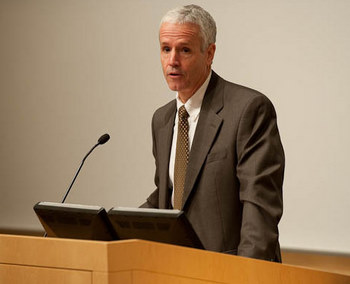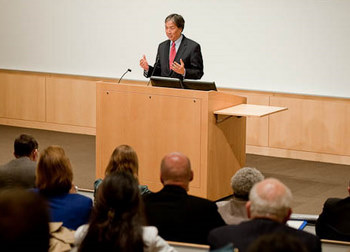Feinberg Hosts Department of Health and Human Services Conference on Childhood Obesity
 |
|
William L. Lowe, Jr., MD, dean of faculty affairs and professor of medicine-endocrinology at Feinberg, discusses the Northwestern Comprehensive Center on Obesity and its Healthy for You, Healthy for 2 program during his welcome remarks. |
Northwestern University Feinberg School of Medicine hosted Assistant Secretary of Health Howard Koh, MD, MPH, as he discussed the childhood obesity action plan recently released by the Department of Health and Human Services Childhood Obesity Task Force.
The event was one of only a handful held across the nation to promote the action plan, which is entitled Solving the Problem of Childhood Obesity Within a Generation. The plan was developed as part of First Lady Michelle Obama’s Let’s Move! campaign, an effort to promote a healthier lifestyle for children.
Welcome remarks were given by William L. Lowe, Jr., MD, dean of faculty affairs and professor of medicine-endocrinology at Feinberg, and Stephen Martin, PhD, MPH, Cook Country commissioner of Public Health.
“It is our great pleasure to host this exciting and important event,” Lowe said. “Childhood obesity is a growing problem in America and we are now facing the prospect of raising the first generation of children who may have a shorter life expectancy than their parents.”
 |
| Assistant Secretary of Health Howard Koh, MD, MPH, outlines the new childhood obesity action plan. |
Feinberg has made a commitment to reverse that trend, Lowe added, pointing to the establishment of the Northwestern Comprehensive Center on Obesity two years ago by former dean Lewis Landsberg and the development of its Healthy For You, Healthy For 2 program, which provides guidance to expectant mothers regarding proper nutrition and overall health for themselves and their unborn child, to illustrate his point.
After the welcome remarks, Koh outlined the childhood obesity issue in the United States, where one in three children is considered obese and one third of all children born in the year 2000 are expected to develop diabetes during their lifetime.
“Situations like these may make some people throw up their hands and say there is no hope,” he said.
Koh then gave an overview of the action plan, which offers a series of 70 recommendations to help keep children healthy. The recommendations fall into five main categories: giving children a healthy start in life; empowering parents and caregivers to make healthy choices; providing healthy food in schools; improving access to healthy, affordable food; and getting children more physically active.
He also discussed some of the obstacles communities face in providing these options to its constituents, such as little or no access to healthy grocery stores or no safe playgrounds for children to use. Finally, Koh made a call to action, asking the public and private sectors to work together toward the goal of creating a healthier society and saying that every industry from housing to urban development to education plays a role in the nation’s well-being.
“Together, we can change a situation of no hope to one of new hope,” he said.






